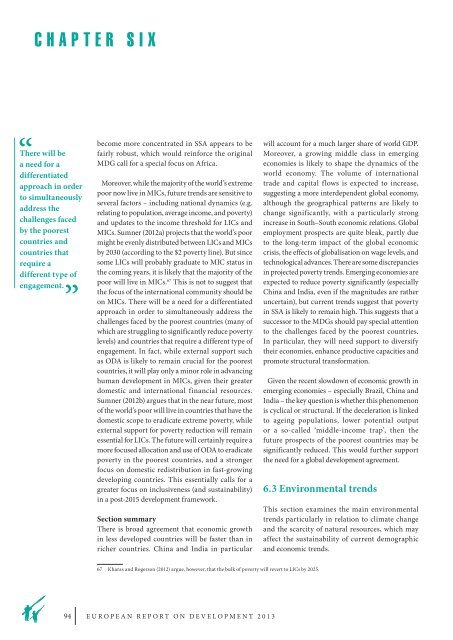Post 2015: Global Action for an Inclusive and Sustainable Future
Post 2015: Global Action for an Inclusive and Sustainable Future
Post 2015: Global Action for an Inclusive and Sustainable Future
You also want an ePaper? Increase the reach of your titles
YUMPU automatically turns print PDFs into web optimized ePapers that Google loves.
CHApTER SIx<br />
There will be<br />
a need <strong>for</strong> a<br />
differentiated<br />
approach in order<br />
to simult<strong>an</strong>eously<br />
address the<br />
challenges faced<br />
by the poorest<br />
countries <strong>an</strong>d<br />
countries that<br />
require a<br />
different type of<br />
engagement.<br />
94<br />
become more concentrated in SSa appears to be<br />
fairly robust, which would rein<strong>for</strong>ce the original<br />
mDG call <strong>for</strong> a special focus on africa.<br />
moreover, while the majority of the world’s extreme<br />
poor now live in mIcs, future trends are sensitive to<br />
several factors – including national dynamics (e.g.<br />
relating to population, average income, <strong>an</strong>d poverty)<br />
<strong>an</strong>d updates to the income threshold <strong>for</strong> lIcs <strong>an</strong>d<br />
mIcs. Sumner (2012a) projects that the world’s poor<br />
might be evenly distributed between lIcs <strong>an</strong>d mIcs<br />
by 2030 (according to the $2 poverty line). but since<br />
some lIcs will probably graduate to mIc status in<br />
the coming years, it is likely that the majority of the<br />
poor will live in mIcs. 67 this is not to suggest that<br />
the focus of the international community should be<br />
on mIcs. there will be a need <strong>for</strong> a differentiated<br />
approach in order to simult<strong>an</strong>eously address the<br />
challenges faced by the poorest countries (m<strong>an</strong>y of<br />
which are struggling to signific<strong>an</strong>tly reduce poverty<br />
levels) <strong>an</strong>d countries that require a different type of<br />
engagement. In fact, while external support such<br />
as oDa is likely to remain crucial <strong>for</strong> the poorest<br />
countries, it will play only a minor role in adv<strong>an</strong>cing<br />
hum<strong>an</strong> development in mIcs, given their greater<br />
domestic <strong>an</strong>d international fin<strong>an</strong>cial resources.<br />
Sumner (2012b) argues that in the near future, most<br />
of the world’s poor will live in countries that have the<br />
domestic scope to eradicate extreme poverty, while<br />
external support <strong>for</strong> poverty reduction will remain<br />
essential <strong>for</strong> lIcs. the future will certainly require a<br />
more focused allocation <strong>an</strong>d use of oDa to eradicate<br />
poverty in the poorest countries, <strong>an</strong>d a stronger<br />
focus on domestic redistribution in fast-growing<br />
developing countries. this essentially calls <strong>for</strong> a<br />
greater focus on inclusiveness (<strong>an</strong>d sustainability)<br />
in a post-<strong>2015</strong> development framework.<br />
Section summary<br />
there is broad agreement that economic growth<br />
in less developed countries will be faster th<strong>an</strong> in<br />
richer countries. china <strong>an</strong>d India in particular<br />
67 Kharas <strong>an</strong>d rogerson (2012) argue, however, that the bulk of poverty will revert to lIcs by 2025.<br />
EuropE<strong>an</strong> rEport on DEvElopmEnt 2013<br />
will account <strong>for</strong> a much larger share of world GDp.<br />
moreover, a growing middle class in emerging<br />
economies is likely to shape the dynamics of the<br />
world economy. the volume of international<br />
trade <strong>an</strong>d capital flows is expected to increase,<br />
suggesting a more interdependent global economy,<br />
although the geographical patterns are likely to<br />
ch<strong>an</strong>ge signific<strong>an</strong>tly, with a particularly strong<br />
increase in South–South economic relations. <strong>Global</strong><br />
employment prospects are quite bleak, partly due<br />
to the long-term impact of the global economic<br />
crisis, the effects of globalisation on wage levels, <strong>an</strong>d<br />
technological adv<strong>an</strong>ces. there are some discrep<strong>an</strong>cies<br />
in projected poverty trends. Emerging economies are<br />
expected to reduce poverty signific<strong>an</strong>tly (especially<br />
china <strong>an</strong>d India, even if the magnitudes are rather<br />
uncertain), but current trends suggest that poverty<br />
in SSa is likely to remain high. this suggests that a<br />
successor to the mDGs should pay special attention<br />
to the challenges faced by the poorest countries.<br />
In particular, they will need support to diversify<br />
their economies, enh<strong>an</strong>ce productive capacities <strong>an</strong>d<br />
promote structural tr<strong>an</strong>s<strong>for</strong>mation.<br />
Given the recent slowdown of economic growth in<br />
emerging economies – especially brazil, china <strong>an</strong>d<br />
India – the key question is whether this phenomenon<br />
is cyclical or structural. If the deceleration is linked<br />
to ageing populations, lower potential output<br />
or a so-called ‘middle-income trap’, then the<br />
future prospects of the poorest countries may be<br />
signific<strong>an</strong>tly reduced. this would further support<br />
the need <strong>for</strong> a global development agreement.<br />
6.3 Environmental trends<br />
this section examines the main environmental<br />
trends particularly in relation to climate ch<strong>an</strong>ge<br />
<strong>an</strong>d the scarcity of natural resources, which may<br />
affect the sustainability of current demographic<br />
<strong>an</strong>d economic trends.

















